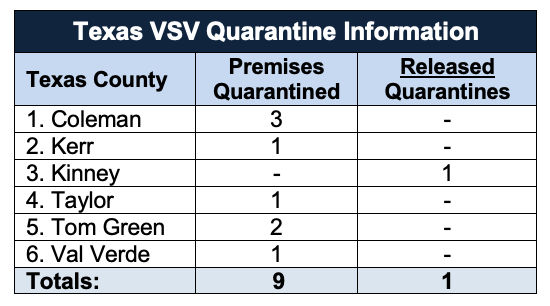Source: Texas Animal Health Commission and USDA APHIS – Veterinary Services
Since the first case of VSV in Texas was confirmed in equine on a Kinney County premises, the Texas Animal Health Commission (TAHC) has received reports of 8 new confirmed cases of vesicular stomatitis virus (VSV).
Texas VSV confirmations since June 24, 2019:
- 3 new VSV-infected equine premises in Coleman County
- 1 new VSV-infected equine premises in Kerr County
- 1 new VSV-infected equine premises in Taylor County
- 2 new VSV-infected equine premises in Tom Green County
- 1 new VSV-infected equine premises in Val Verde County
The newly confirmed premises are under quarantine by the TAHC. Affected horses will be monitored by regulatory and authorized veterinarians until premises are eligible for quarantine release 14 days after clinical VSV signs are observed.
To date, 10 premises in 6 Texas counties have been confirmed with VSV. Currently affected counties include: Coleman, Kerr, Kinney, Taylor, Tom Green, and Val Verde counties. Of the 9 premises, 1 has been released.
TAHC will send out VSV updates every Friday and all cases will be reported to the Equine Disease Communication Center. For VSV history and past updates click here. To view the best health care info VSV situation reports click here.
Since the last USDA-APHIS Veterinary Services (VS) situation report on July 3, 2019, Colorado has 1 new VSV-infected equine premises in Larimer County and 1 new VSV-infected equine premises in Weld County.
In New Mexico, new VSV-infected equine premises have been confirmed in Los Alamos, Valencia, and Sandoval counties.

What Equine and Cattle Owners Need to Know:
- VSV is a viral disease that primarily affects horses and cattle.
- In the past decade, the Southwestern and Western United States have experienced a number of VSV outbreaks. Outbreaks usually occur during the warmer months, often along waterways.
- VSV normally has an incubation period of 2-8 days before the infected animal develops blisters that swell and burst, leaving painful sores. The virus can be transmitted through direct contact with infected animals or by blood-feeding insects.
If VSV is confirmed, infected animals are quarantined for 14 days after clinical signs of lesions are observed. This short-term quarantine helps prevent the movement of animals and the spread of the disease to other premises, fairs or markets.
Strategies for Preventing VSV
Even with the best defensive measures, VSV could infect a herd. However, these tips may help protect livestock:
- Control biting flies
- Keep equine animals stalled or under a roof at night to reduce exposure to flies
- Keep stalls clean
- Feed and water stock from their individual buckets
- Do
n’t visit a ranch that’s under quarantine for VSV. Wait until the animals have healed
For more information about VSV visit https://www.tahc.texas.gov/news/brochures/TAHCBrochure_VS.pdf.
A USDA APHIS-VS fact sheet about Vesicular Stomatitis is available at http://www.aphis.usda.gov/publications/animal_health/content/printable_version/fs_vesicular_stomatitis_2012.pdf
